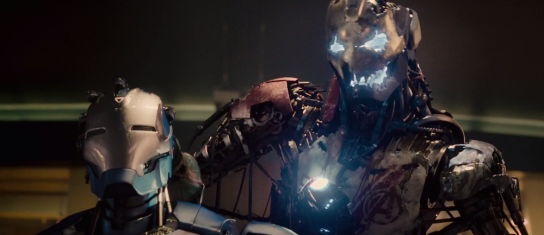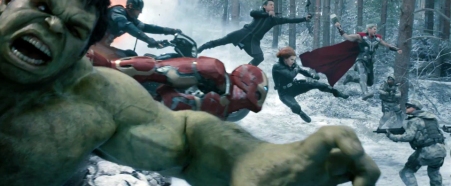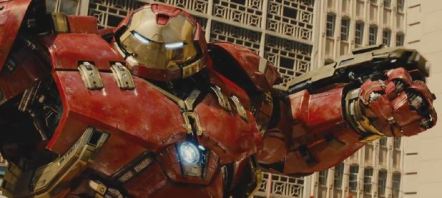
In a fastidiously chaotic movie, one of four new characters mutters, as if to himself, “Humans are odd. They think order and chaos are somehow opposites.” This question of order vs. chaos, war vs. peace, good vs. evil, is standard comic book fare, but what makes Age of Ultron so deft and satisfying is the way it ties up all sorts of threads from previous movies to create a nearly seamless whole – chaos and order, personified in one movie.
These movies have become something more than the popcorn super-sweet wish fulfillment of the first Avengers. Though I wouldn’t call Ultron as good as its predecessor, as these titanic personalities could only clash for the first time, once, that may be asking the wrong question. The director, Joss Whedon, is going the traditional superhero sequel route of darker and grittier, but he’s also trying something risky – creating a world where the very reason the Avengers exist is so they can put themselves out of a job. And make no mistake – this is definitely a job.
Within the first three minutes of Ultron we get a slow-mo money shot of all six of our heroes in perfect tandem, mowing down hordes of Hydra soldiers, in a mad charge to take back Loki’s scepter. A similar moment occurs at the end of Avengers, but the difference is this is now rote for them – they are clocked in. It would be exhausting for us if the quips and gallows humor were not flying at a superheroic pace themselves. This is a joy of the movie that the first one lacked – now that our heroes are a team, we get to see more of that brilliant interplay. Whedon is doing something extremely clever here: beginning the movie with the Avengers as a perfectly functioning unit, and slowly tearing them down – almost the exact opposite of the first film.

Within ten minutes, the exhaustion is seen even in the effortless ballet ballet of punches, smashes, and explosions. There’s a smirk in the line a baffled Hydra officer sputters to his boss when asked if the attackers can be stopped: “It’s the Avengers….”Even the bad guys know these guys are invincible. A parody of how ridiculously overpowered the Avengers are, it gives us the sense that they need more than another Loki – they need something that might actually have a chance of destroying them.
And of course they get it, in the form of Tony Stark’s global peacekeeping program, Ultron. The franchise, so far, has very much been Tony Stark’s story – beginning in 2008’s Iron Man, Stark has always struggled to bring peace. He boasts facetiously in Iron Man 2, “I have successfully privatized world peace,” but now he has his sights set on protecting the Earth from space invaders, after he receives a haunting vision where sees the entire avenging force dead, because of him.
Ultron, voiced with playful menace and commanding presence by James Spader, is Stark’s baby – a sarcastic, self-assured metal man who sees the only way to peace is through humanity’s extinction. He’s entirely a special effect, but the metallic humanity Spader infuses into his voice and the detailed effects work on Ultron’s body truly make him come alive. He quotes Scripture and muses philosophically about religion and God. He is Stark, gone mad with power, bent on fixing all wrongs, at all costs, a worthy successor to Tom Hiddleston’s chilling Loki, and a continuation of Marvel’s unspoken motto that character matters more than plot. Guardians of the Galaxy was a smash hit not because of its story (which was riddled with plotholes and not very original), but because of its characters.
In Ultron, Bruce Banner and Black Widow strike up an unlikely yet perfect romance full of tragedy and humanity. Thor comes to grips with his burden of responsibility and history of pride. Captain America acts as the moral center even as his psyche grapples with the after effects of the events of Winter Soldier. But the big surprise here is Hawkeye, played with quiet dignity and fatherly care by Jeremy Renner – a lone human in a sea of dark monsters. It’s a weird choice that winds up centering the Avengers in a much needed way.

This is all juicy character-centric movement that you can’t get in something as simple as a sequel. By this point in the MCU, you can barely get through a line of dialogue that doesn’t pick up on something that came before. Bruce Banner off-handedly swinging an empty baby’s crib inThe Avengers turns into a painful confession of intertility in Age of Ultron. Nick Fury telling Loki, “Yeah, you say peace, but I kinda think you mean the other thing,” is continued when Ultron mocks the Avengers with, “I think you’re confusing peace with quiet.”
More importantly than callbacks, though, our heroes experience dramatic growth that fundamentally changes them. Black Widow starts as a minor ass-kicking woman in Iron Man 2, reveals a bit of her dark past inThe Avengers, shows herself to have a deeply ingrained identity crisis in The Winter Soldier, and for the first time in four movies, begins to show some vulnerability in Age of Ultron. Captain America goes from a man almost literally dying to fight, to a man lost in time, to a leader, to a disillusioned soldier, and finally to a battle-scarred, hardened soul, fundamentally different from the idealistic wet-behind-the-ears skinny boy we first saw him as. Even a side character like War Machine gains some quirks and definition the more we see of him.
So what makes Avengers: Age of Ultron so damned GOOD is not necessarily that it has a perfect plot, or that it is as game-changing as its predecessor, but rather that it continues the franchise in such a solid and entertaining direction while deepening the relationships that we have spent 9 movies building, and that’s not even counting the Agents of S.H.I.E.L.D. or Daredevil TV shows. This movie continues to heighten the Avengers’ reality while keeping them grounded.
It is because of this humanity that the long, explosive, and crammed action scenes feel all the more threatening and true. As the audience, we came to watch stuff blow up, but there’s only so much of that we can take before it numbs, and we see this same exhaustion in the eyes of our heroes. Whedon masterfully succeeds at this balancing act by giving us exactly what we want – beautiful, eye-popping, and perfectly choreographed action scenes matched by razor sharp, character-centric dialog, with our heroes at the center, who only fight in hope of never fighting again.
